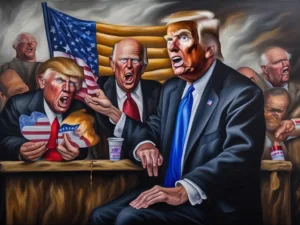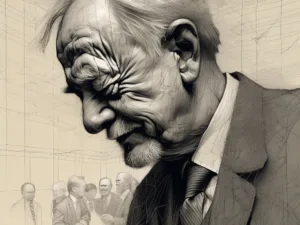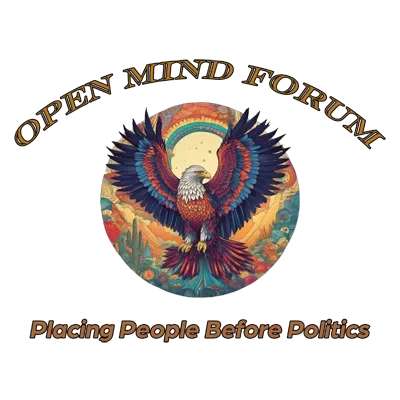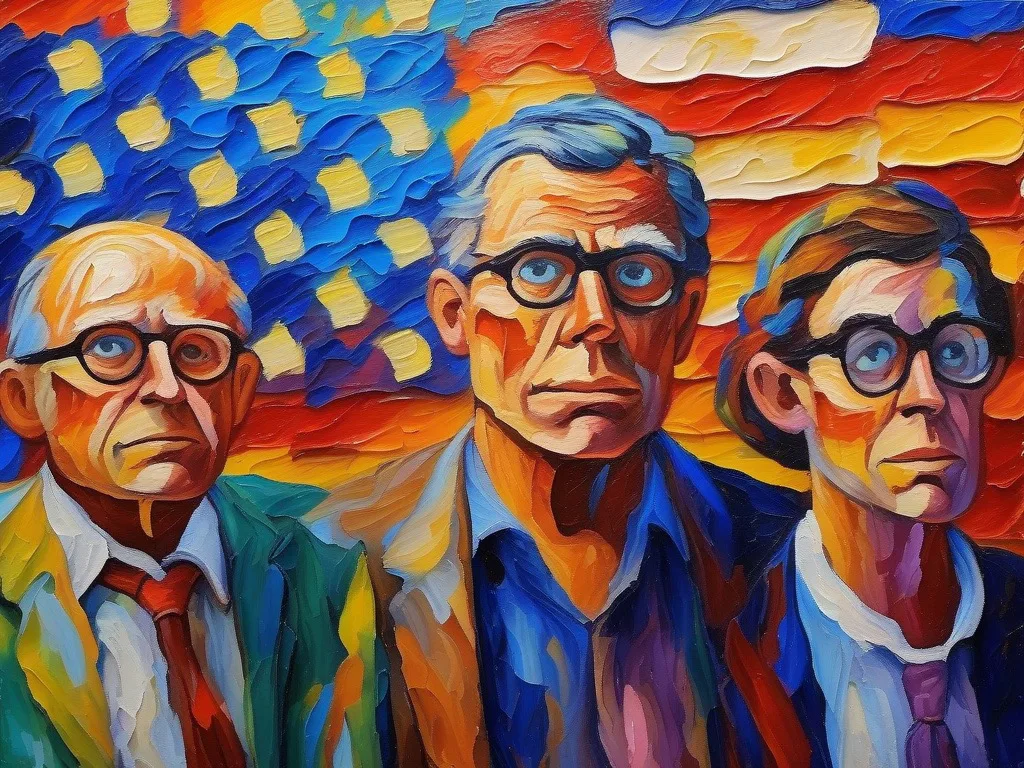A 50-Year Descent into Deregulation, Globalization, and Authoritarian Drift
Elections in the United States and a Voter’s Bitter Choice: An Introduction
Elections in the United States represent a painful paradox for many Americans. With little real difference between the Democratic and Republican parties, voters feel compelled to select the “lesser of two evils,” only to watch as their choice enacts policies that serve corporate interests and undermine

democratic ideals. For nearly half a century, voters have witnessed both parties implement similar strategies that prioritize the wealthy and corporate elite. This bipartisan shift has intensified distrust, political polarization, and a profound sense of alienation, pushing many Americans to disengage from the democratic process altogether.
Elections in the United States: Deregulation–The First Step in Bipartisan Convergence
The roots of today’s deregulation agenda reach back to Ronald Reagan’s presidency, which embraced “free-market” ideals. Reagan’s administration dismantled significant regulations across industries, including banking, energy, and telecommunications (Harvey, 2007). In financial services, deregulation meant repealing New Deal-era policies designed to stabilize the economy. Reagan eliminated regulatory safeguards, claiming they stifled business innovation. This decision emboldened monopolies and speculative investments, sowing the seeds for the 2008 financial crisis, where major institutions collapsed due to the unchecked risk-taking that deregulation permitted (Harvey, 2007).
Bill Clinton furthered this trend by signing the Financial Services Modernization Act in 1999, effectively repealing the Glass-Steagall Act, which had maintained a separation between commercial and investment banking since 1933. Clinton, a Democrat, justified this as an advancement for “consumer choice.” However, the policy’s actual effect was to embolden risky financial practices that contributed directly to the 2008 crisis (Galbraith, 2012). Both Democrats and Republicans endorsed deregulation, solidifying a partnership with corporate interests at the expense of the American public.
Free Trade and Globalization: Shattering the American Working Class
Elections in the United States seldom address the fallout of free trade and globalization. During the Clinton administration, the 1994 North American Free Trade Agreement (NAFTA) promoted trade by removing tariffs between the U.S., Canada, and Mexico. Proponents argued NAFTA would increase prosperity for all involved. However, NAFTA displaced hundreds of thousands of American manufacturing jobs as companies moved production abroad

to exploit cheaper labor (Stiglitz, 2019). In cities like Detroit and Cleveland, factories shuttered, erasing local economies that had once sustained entire communities.
Subsequent administrations continued the free trade agenda. George W. Bush’s administration, for example, pursued free trade agreements with countries in Latin America and Southeast Asia. Barack Obama also championed the Trans-Pacific Partnership (TPP), furthering the offshoring trend that hollowed out domestic industries. Globalization enabled corporations to circumvent U.S. labor standards and environmental protections by moving operations abroad (Luce, 2017). These policies, embraced by both parties, widened income inequality and strained working-class communities, driving a wedge between elites and the rest of the American populace.
Elections in the United States: The Power of Corporate Interests legally Buying Political Influence
Elections in the United States often highlight campaign finance as a significant, though often overlooked, issue. The 2010 Supreme Court decision in Citizens United v. FEC enabled unlimited spending by corporations and wealthy individuals on political campaigns, casting a long shadow over American politics (Moyers & Winship, 2016). Politicians from both parties benefit from this influx of money, which has fueled the rise of “Super PACs” and corporate lobbying efforts that shape public policy.
For example, pharmaceutical companies donate millions of dollars to both Democratic and Republican campaigns, influencing healthcare policy. The high cost of prescription drugs persists partly because lawmakers resist regulating drug prices to avoid alienating powerful donors (Klein, 2020). This relationship between corporate donations and policy outcomes fosters cynicism among voters, who see elected officials as corporate employees rather than public servants. With financial incentives driving policy, the interests of the wealthy continue to outweigh those of the average voter.
Self-Interest and Legislative Paralysis: When Governing Takes a Back Seat
Self-interest drives not only campaign financing but also the legislative priorities of both parties. With each election cycle, Republicans and Democrats promise bold reforms, yet progress stalls in favor of partisan gridlock and political posturing. Under President Trump, for example, Congress passed substantial tax cuts that primarily benefited corporations and the wealthy. Although proponents claimed the cuts would stimulate economic growth, their actual effect was to widen the wealth gap (Levitz, 2018).
Similarly, Joe Biden’s recent presidency has shown reluctance to roll back Trump’s corporate tax cuts. Instead, Biden has promoted policies that appear progressive but ultimately fail to confront systemic issues, such as wealth inequality or corporate overreach (Klein, 2020). Self-interest among legislators, tied to the interests of corporate donors, perpetuates a cycle of superficial reform that serves the elite while failing to address the underlying problems facing ordinary Americans.
The Drift Toward Authoritarianism through the Erosion Democratic Norms
Elections in the United States once symbolized the democratic process, but today they reveal the nation’s drift toward authoritarianism. The George W. Bush administration established sweeping surveillance measures under the Patriot Act, justifying these measures as necessary for national security (Scheppele, 2004). These changes represented a shift in executive power, as the government gained authority to monitor citizens without judicial oversight. This erosion of privacy rights under both Republican and Democratic administrations has continued with successive leaders, normalizing governmental overreach.
Under Donald Trump, this authoritarian trend intensified. Trump’s “law and order” rhetoric promoted aggressive policing and stifled political dissent, while his administration sidelined Congress in favor of executive actions on immigration, healthcare, and trade. This expansion of executive power has raised concerns that future presidents, regardless of party, may exploit these precedents to consolidate authority further (Levitsky & Ziblatt, 2018). The risk of authoritarianism becomes more pronounced when leaders see themselves as above the law, a danger that challenges the very foundations of American democracy.
Conclusion: A Path to Authoritarianism or a Call for Reform? Elections in the United States
Elections in the United States today offer a grim choice between parties that seem more similar than different. Deregulation, globalization, and corporate influence have converged to create a political landscape that prioritizes elite interests. As bipartisan policies erode workers’ rights, restrict democratic freedoms, and widen income inequality, Americans face a profound question: can democracy withstand a system that so blatantly favors the wealthy? As political power continues to concentrate among the elite, the threat of authoritarianism looms larger, endangering the very fabric of the republic. Without meaningful reform, American democracy may continue its slide toward a state that protects the ultra-rich at the expense of everyone else.
Sources Cited
Galbraith, J. K. (2012). Inequality and Instability: A Study of the World Economy Just Before the Great Crisis. Oxford University Press.
Harvey, D. (2007). A Brief History of Neoliberalism. Oxford University Press.
Klein, N. (2020). On Fire: The (Burning) Case for a Green New Deal. Simon & Schuster.
Levitsky, S., & Ziblatt, D. (2018). How Democracies Die. Broadway Books.
Luce, E. (2017). The Retreat of Western Liberalism. Atlantic Monthly Press.
Moyers, B., & Winship, M. (2016). “Our Politicians Are Corporate Employees.” Moyers & Company.
Scheppele, K. L. (2004). Legal and Extra-Legal Emergencies. Harvard University Press.
Smith, D. (2014). The Economic Legacy of Ronald Reagan: A Comparative Study. University of Michigan Press.
Stiglitz, J. E. (2019). People, Power, and Profits: Progressive Capitalism for an Age of Discontent. W.W. Norton & Company.
Suggestions for Further Reading
– Harvey, D. (2007) – A Brief History of Neoliberalism: Analyzes the rise of neoliberal policies and their effects on global economies.
– Galbraith, J. K. (2012) – Inequality and Instability: Explores how deregulation led to economic volatility and inequality.
– Levitsky, S., & Ziblatt, D. (2018) – How Democracies Die: Details how democracies gradually drift toward authoritarianism.
– Luce, E. (2017) – The Retreat of Western Liberalism: Examines the decline of liberal values in the Western world.
– Stiglitz, J. E. (2019) – People, Power, and Profits: Argues for a capitalist reform in response to growing inequality.
– Moyers, B., & Winship, M. (2016) – “Our Politicians Are Corporate Employees”: Analyzes corporate influence on American policymakers.
– Scheppele, K. L. (2004) – Legal and Extra-Legal Emergencies: Discusses the implications of governmental overreach under surveillance programs.
– Smith, D. (2014) – The Economic Legacy of Ronald Reagan: A comparative look at the economic impacts of Reagan’s policies.
– Klein, N. (2020) – On Fire: The (Burning) Case for a Green New Deal: Discusses the need for radical policy reform in the face of economic and environmental crises.
Disclaimer: The images and videos in this post are AI-generated creations, intended purely for illustrative and conceptual purposes. They are not real-life representations and should not be interpreted as such. Their sole purpose is to offer a visual means of exploring the topics discussed in this post.




